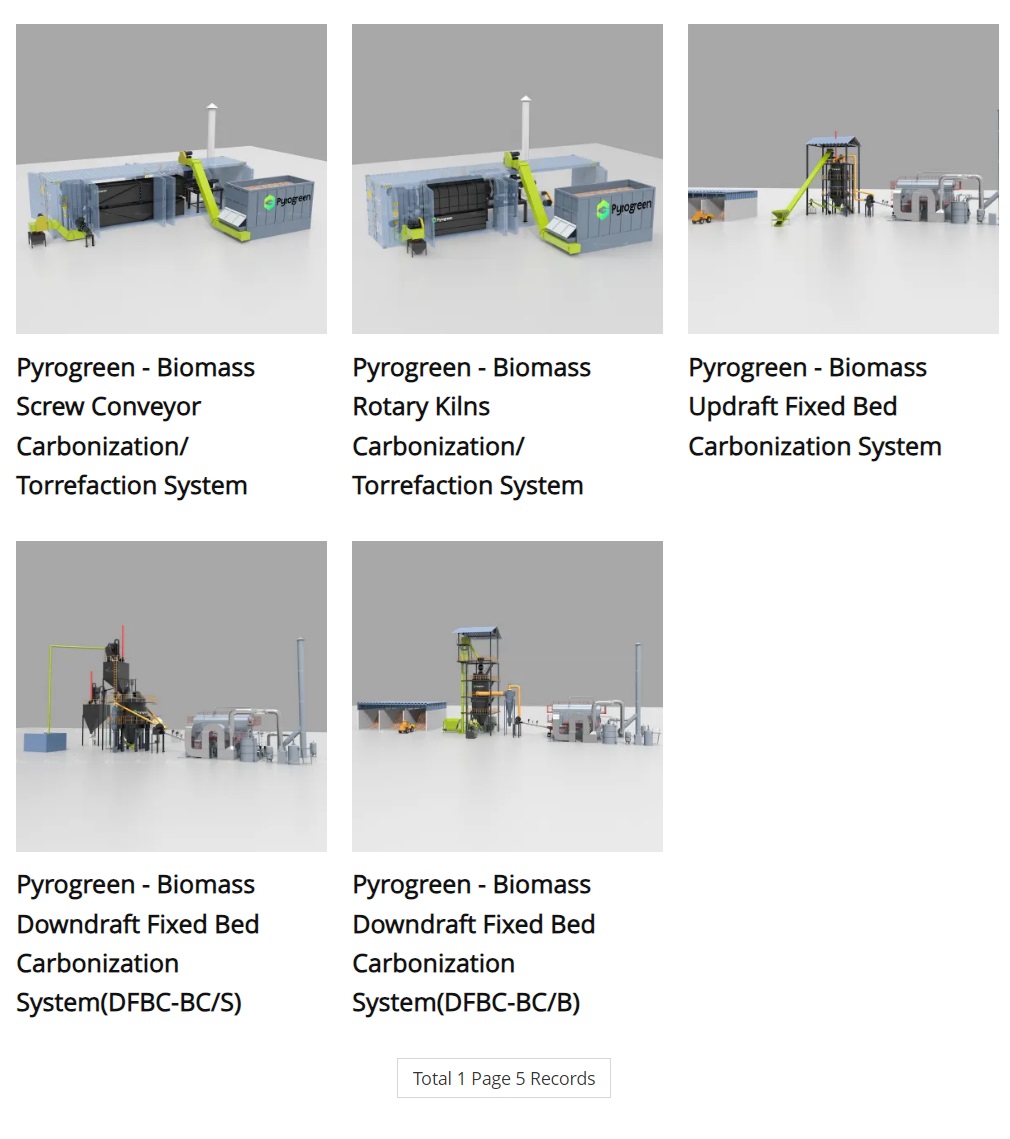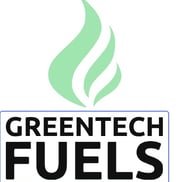GreenTech Fuels Biomass Carbonizer
GreenTech Fuels’ Biomass Carbonizer is an advanced technology designed to convert organic biomass into biochar and other valuable by-products through a controlled thermal process called pyrolysis. The process involves heating biomass in the absence of oxygen to break it down into solid, liquid, and gaseous products. Biochar, the main solid product, is a highly stable form of carbon that has numerous applications, from soil enhancement to energy generation.
What is Biomass Carbonization?
Biomass carbonization is the process of converting organic materials (such as agricultural residues, forestry waste, or other biomass) into biochar through pyrolysis, where the biomass is heated in a low-oxygen environment. This process results in:
Biochar: A stable form of carbon that is rich in nutrients and has numerous uses in agriculture and environmental management.
Bio-oil: A liquid fuel that can be used for energy production or further refinement into chemicals and biofuels.
Syngas (Synthesis Gas): A mixture of gases, including carbon monoxide, hydrogen, and methane, that can be used for energy production.
How GreenTech Fuels Biomass Carbonizer Works:
Feedstock Preparation: Biomass feedstocks, such as wood chips, agricultural waste (corn stalks, rice husks, etc.), forestry residues, or municipal solid waste, are first prepared by drying and shredding them into suitable sizes. Proper preparation ensures the efficiency of the carbonization process.
Carbonization Process: The prepared biomass is fed into the carbonizer, where it is subjected to high temperatures (typically between 400-700°C) in the absence of oxygen. This thermal degradation process occurs in several stages:
Drying: Moisture in the feedstock is evaporated.
Pyrolysis: Biomass is decomposed into biochar, bio-oil, and syngas.
Cooling and Collection: The biochar is then cooled, while the bio-oil and syngas are collected and processed.
Biochar Production:
The main product, biochar, is a stable, carbon-rich material that retains many of the nutrients present in the original biomass. Biochar can be used to improve soil quality by increasing nutrient retention, improving soil structure, and enhancing water retention.
Bio-oil and Syngas:
Bio-oil is a liquid fuel that can be used for energy generation or as a raw material for chemicals. It is also a valuable by-product in the carbonization process.
Syngas is collected during the carbonization and can be used to generate electricity or heat. The gas mixture can be cleaned and processed for various industrial uses.
Key Features of GreenTech Fuels Biomass Carbonizer:
Efficient Carbonization Process:
GreenTech Fuels’ biomass carbonizers are engineered for high efficiency, ensuring optimal conversion of biomass into biochar, bio-oil, and syngas. This allows for a higher yield of biochar compared to other methods.
Eco-friendly:
The carbonization process is environmentally friendly as it helps in carbon sequestration, turning carbon from biomass into a stable form (biochar), which can be stored in soil for long periods, mitigating greenhouse gas emissions.
Energy Production:
The syngas and bio-oil produced during the process can be used as renewable energy sources. Syngas can fuel generators, and bio-oil can be used to power heating systems, providing energy for both industrial and residential applications.
Sustainable Waste Management:
The carbonizer helps convert organic waste, such as agricultural residues and wood waste, into valuable products, reducing waste disposal issues and promoting a circular economy.
Low Emissions:
The process is designed to minimize emissions of pollutants, ensuring that GreenTech Fuels’ biomass carbonizers operate within environmentally compliant standards. The collection and cleaning of syngas reduce harmful emissions to the atmosphere.
Scalable:
The biomass carbonizer systems offered by GreenTech Fuels are scalable and can be customized to meet the energy and production needs of various applications, from small-scale community projects to large-scale industrial facilities.
Versatile Feedstock Options:
GreenTech Fuels’ carbonizers can process a wide range of feedstocks, including agricultural residues, wood chips, forestry waste, biomass from waste products, and even municipal solid waste.
Benefits of GreenTech Fuels Biomass Carbonizer:
Soil Improvement:
Biochar, the primary product of carbonization, is widely used in agriculture as a soil amendment. It improves soil fertility, enhances water retention, reduces soil erosion, and helps in nutrient cycling.
Waste Reduction:
By converting organic waste into biochar, bio-oil, and syngas, GreenTech Fuels’ carbonizer helps reduce waste volume and the burden on landfills, offering an effective waste-to-energy solution.
Carbon Sequestration:
Biochar is a stable carbon sink, meaning it locks away carbon from the atmosphere for extended periods. This makes biomass carbonization a valuable tool in carbon offset programs and climate change mitigation efforts.
Renewable Energy Generation:
Both syngas and bio-oil can be used to generate renewable energy. The syngas can be burned to produce electricity or heat, while bio-oil can be used in industrial burners or refined into biofuels for transportation.
Economic Benefits:
Biomass carbonization can help reduce reliance on fossil fuels, offering industries an opportunity to switch to renewable energy. Additionally, the production of biochar has commercial value in agriculture and environmental management.
Enhanced Efficiency:
GreenTech Fuels' carbonizers are equipped with advanced control systems that monitor and optimize the carbonization process, ensuring high yields of biochar and other by-products while maintaining energy efficiency.
Applications of GreenTech Fuels Biomass Carbonizers:
Agriculture:
Biochar produced by the carbonizer can be used as a soil conditioner to improve soil health, increase crop yields, and help retain moisture, making it particularly beneficial for sustainable agriculture.
Renewable Energy:
The syngas and bio-oil generated from biomass carbonization can be used for electricity generation, industrial heating, and even converted into biofuels for transportation.
Waste Management:
The biomass carbonizer provides an effective solution for managing agricultural residues, forest waste, and even municipal solid waste by converting it into valuable energy and biochar.
Environmental Remediation:
Biochar has been shown to be effective in remediating contaminated soils, such as those affected by heavy metals, making it useful for environmental restoration projects.
Carbon Offset Programs:
The carbon sequestration potential of biochar makes it an important tool in carbon offset programs, allowing industries to compensate for their carbon emissions.
Conclusion:
GreenTech Fuels’ Biomass Carbonizer offers a sustainable, efficient, and environmentally friendly solution for biomass conversion. By turning waste into valuable by-products like biochar, bio-oil, and syngas, this technology supports a wide range of applications, from renewable energy generation to soil enhancement. It also plays a significant role in carbon sequestration and waste management, helping businesses and communities transition to a more sustainable future.


HOME
ABOUT US
PRODUCTS
PROJECTS
TECHNOLOGY
SOLUTIONS
MEDIA CENTRE
CONTACT US
© 2024. All rights reserved.
PRODUCTS
BIOWATT COMPACT BIOMASS GASIFICATION POWER GENERATION SYSTEM
BIOMASS GASIFICATION POWER PLANT
BIOMASS GASIFIER
BIOMASS CARBONIZER
BIOMASS GASIFIER FOR GREEN-CHEMICAL
BIOMASS GASIFICATION BOILER
BIOMASS CARBONIZATION POWER PLANT
BIOMASS CARBONIZATION BOILER
COAL GASIFICATION POWER PLANT
COAL GASIFIER
WASTE GASIFIER
WASTE GASIFICATION POWER PLANT
SYNGAS GENERATOR SET
PRODUCER GAS GENERATOR SET
BIOMASS GAS GENERATOR SET
COAL GAS GENERATOR SET
GAS PURIFICATION SYSTEM
DECORBONIZATION
GREENTECH SOLAR
NANO HYDROPOWER
GREENTECH BATTERIES
HUSKTECH
CONTACT US
GREENTECH FUELS
GREENTECH HABITAT CENTER
CHOUPARAN, HAZARIBAGH, JHARKHAND, INDIA - 825406
📞 +91 6207423061
📞 +91 9973352599
www.greentechfuels.in
📧 info@greentechfuels.in


